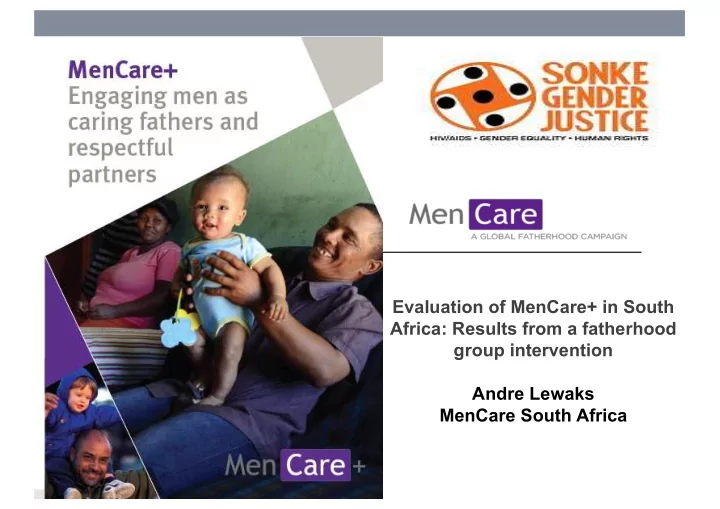

Evaluation of MenCare+ in South Africa: Results from a fatherhood group intervention Andre Lewaks MenCare South Africa
To promote men’s involvement as equitable, non- violent fathers and caregivers in order to achieve family well-being, gender equality, and better health for mothers, fathers and children.
South African Context • High numbers of father absence in South Africa • Strong traditional cultural and patriarchal norms • Well-established link between inequitable gender norms and violence. • Almost 1 out of every 2 men (48%) have admitted to being violent towards their intimate partner (MRC) • 56% of all murder of women in South Africa are committed by the victims partner
Father Presence per province YEAR YEAR PERCENTAGE FATHER PART OF HOUSEHOLD Western Cape 2011 56,2 2014 56,5 Eastern Cape 2011 25,1 2014 25 GAUTENG 2011 53 2014 56,1 KZN 2011 29,6 2014 20,4 LIMPOPO 2011 27,5 2014 26,8
Fathers and Unpaid Care in South Africa • Women do 8 times more unpaid work than men • Women spend more time on combined paid and unpaid work than men. • women make up over two thirds of primary caregivers for people living with HIV/AIDS • one in three fathers remains the primary caregiver when the mother die compared with more than two in three mothers when the father dies.
There is hope: We know • Father involvement contributes to socio-emotional development of children • social competence, self esteem, life skills and confidence • Rough and tumble play helps to children to manage aggressive impulses and to control their emotions • Cognitive development • Father involvement promotes independence and exploration of the outside world • Language abilities • Physical health and development • Problem free pregnancies, higher motor skills for children
MenCare+ Project Design Advocacy and COMMUNITY Parenting sessions Policy work MOBILISATION Training of health care practitioners
MenCare Parenting Intervention • Group Intervention consists of 12 session focussing on: • Expectations • Fathers Impact • Pregnancy • Birth • Family Planning • Caregiving • Gender • Non-Violence • Needs and rights of children • Division of caregiving • Final reflections
Evaluation Methodology • 1550 participants in the Parenting groups. • Quantitative analysis of pre and post questionnaires collected data about Gender Equitable Attitudes (GEA / GEM). • Qualitative interviews • Focus group discussions with 21 participants • 35 telephonic interviews
Main Findings • Increase in gender equitable attitudes. ‘A woman’s most important role is to take care of her home and cook for her family’ • PRE: 78.3% agrees • POST: 58.7% agrees • “…for me I will say this programme helped me because from the background that I grew up in, that was a very traditional background, where we believe a man can’t cook, a man cannot even look in the pot, bath children… But when I came to the programme I had to learn and cut those bounds, nowadays I can cook, I stay with the children at home, I can do everything and I am not ashamed of it.” Focus Group Discussion Participant
Results ‘Men who use contraceptives seem weaker than men who do not’ • PRE: 30.7% agrees • POST: 16% agrees ‘Condoms are unreliable for pregnancy’ • PRE: 45.6% agrees • POST: 38.5% agrees ‘ Condoms ruin the sex act’ • PRE: 47.3% agrees • POST: 29.8% agrees
We found ▪ Significant increase of gender attitude, t (96)= 4.79, p < .00, r = .44 • PRE (M= 2.11, SD= 0.57) • POST (M= 2.31, SD= 0.39) ▪ Significant increase of attitude towards contraceptives, t(96)= 4.79, p < .001, r = .33 • PRE (M= 3.42, SD= 0.65) • POST (M= 3.68, SD= 0.69)
We also found • Increase condom use amongst couples • Men are more supportive towards their partners during prenatal visits • Changed views of what it is to be a father • Slight decrease in substance abuse • Increased involvement in caregiving
Challenges • Culture and tradition is still an issue • Access to contraceptives • Male friendly health facilities
Thank you! Get us on • http://men-care.org/ • Facebook
Recommend
More recommend